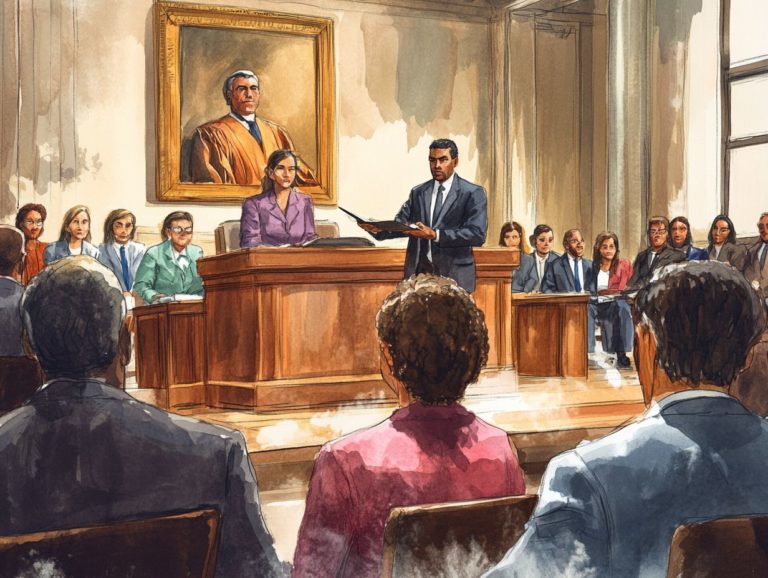How Can You Obtain Legal Records?
Finding legal records can seem overwhelming. However, understanding their nature and how to access them is vital for anyone seeking information.
Whether it s criminal, civil, or family-related documents, each type serves a unique purpose. Let s explore exciting ways to access these records, from public databases to official requests.
Join us as we clarify everything you need to know about legal records.
Contents
Key Takeaways:

Legal records are official documents that provide information on an individual’s criminal, civil, or family history. You can access these records through public databases, Freedom of Information Act requests, or by visiting court offices. Be aware, however, that privacy concerns may limit access to some records.
Understanding Legal Records
Understanding legal records is crucial for navigating the justice system. These documents hold valuable information that can affect both civil and criminal cases.
Legal records are carefully maintained by federal and state courts. They serve as essential resources for legal professionals and the public.
From case files to electronic records accessible through systems like PACER (Public Access to Court Electronic Records), these documents foster transparency and informed decisions.
Preserving historical court records is also vital for research and genealogy studies, ensuring our legal heritage is passed down.
What are Legal Records?
Legal records are documents created during court proceedings. They include rulings, opinions, filings, and transcripts.
These documents are essential for maintaining the integrity of the legal system. They provide an official account of all aspects of a case.
For example, case files contain pleadings, motions, and discovery materials, offering insights into the strategies of both parties.
Research databases are now important tools for accessing these records, helping both legal professionals and the public find relevant information quickly.
Types of Legal Records
Legal records fall into several categories, including criminal, civil, and family records. Each serves a unique function in the judicial system and impacts public access to court information.
Recognizing these differences helps promote transparency and integrity in legal proceedings.
Criminal Records
Criminal records document an individual’s criminal history, including arrests, charges, and court decisions. They are vital for law enforcement, employers, and legal representatives.
Created by police departments and courts, these records track interactions with the legal system, from minor infractions to serious offenses.
Accessing criminal records is made easier through systems like the Voice Case Information System, allowing authorized users to find relevant information efficiently.
In situations involving custody disputes or employment background checks, criminal records can heavily influence decisions, highlighting their importance for public safety.
Civil Records

Civil records capture non-criminal legal disputes. They encompass everything from contracts to property disagreements and family law cases, offering essential insights into civil court proceedings.
These records are invaluable for grasping how various legal matters are resolved. They serve as critical evidence in federal court and other judicial contexts. In contrast to criminal records, which relate to offenses against the state and involve law enforcement actions, civil records focus on private disputes between individuals or entities.
Public access to these documents is often made easy through case locator tools, giving you the power to research and verify ongoing or past cases. This transparency helps uphold justice and ensures fair legal practices.
Family Records
Family records encompass a range of legal documents related to familial matters. This includes divorce decrees, custody agreements, and adoption papers. They play a pivotal role in legal custody cases.
These documents are not merely formalities; they serve as the backbone of judicial decisions. They provide crucial information that helps you navigate the complexities of family law. For example, if you re looking into genealogy research, tracing your lineage through family records can reveal important details that bolster claims in custody disputes or adoption proceedings.
Public access to certain types of records allows prospective guardians to fully grasp a child’s familial background. This ensures transparency and informed decisions in what is often an emotional and challenging process.
Therefore, the significance of these records cannot be overstated; they help shape the lives of families involved.
Methods for Obtaining Legal Records
Act now to obtain legal records using effective methods.
Consider utilizing public record databases, submitting Freedom of Information Act (FOIA) requests, or visiting court clerk offices. The FOIA allows individuals to request access to federal government records.
Each of these options makes it easy to access vital court documents, ensuring you have the information you need at your fingertips.
Public Record Databases
Public record databases function as centralized collections for court records. They allow you to efficiently conduct case tracking and research projects.
These digital platforms are specifically designed to enhance your access to vital information. They enable you to sift through numerous records, including civil, criminal, and family court documents.
You can take advantage of various features, such as online ordering, which simplifies obtaining detailed case histories and legal outcomes.
With user-friendly interfaces, these databases provide filters that allow you to narrow down your searches by case number, jurisdiction, or date.
As a result, you are empowered to gather pertinent details swiftly and accurately, whether you’re a plaintiff, defendant, or researcher. This streamlined access facilitates well-considered choices in your legal endeavors.
Freedom of Information Act Requests
The Freedom of Information Act (FOIA) offers you a powerful legal pathway to access government-held records. This fosters transparency and accountability.
With this act, you can request a variety of records, from memoranda and reports to emails, as long as they are maintained within federal agencies. Your journey typically starts by submitting a written request to the appropriate administrative office, clearly outlining the specific information you seek.
It s crucial to be aware that certain limitations are in place under the e-Government Act. This safeguards sensitive national security information and personal privacy. Understanding these intricacies can significantly improve your chances of obtaining the requested information promptly.
In conclusion, obtaining legal records is essential for navigating legal matters effectively. Take advantage of the available resources to ensure you make informed decisions.
Court Clerk Offices

Court clerk offices are vital for managing and providing access to legal records and court documents. They act as key points of contact for anyone seeking information.
These offices help you understand the legal system. They ensure that case reviews are conducted efficiently and transparently.
You can easily search for important court records at your convenience.
Court clerks maintain the integrity of these documents, ensuring that all filings are correctly recorded and available for public inspection.
Their guidance can simplify the process for those unfamiliar with legal procedures, fostering trust in the judicial system.
Potential Challenges and Limitations
Navigating legal records presents various challenges and limitations.
Privacy concerns often restrict access to sensitive information and closed case files.
Privacy Concerns
Privacy issues significantly affect how accessible legal records are, especially in sensitive matters like criminal records or family disputes. This raises important questions about balancing public access to legal information with the right to privacy.
While transparency is essential for maintaining public trust in the legal system, misuse of sensitive data can have lasting consequences for individuals whose records are accessed. As you seek information, you may navigate a complex web of regulations and restrictions.
This situation complicates obtaining legal documents and underscores the need for thoughtful policies that protect personal privacy while allowing public access to essential information when appropriate.
Restricted Access to Certain Records
Some legal records may be off-limits due to specific legal stipulations, particularly those outlined in the e-Government Act, which governs how sensitive information is shared.
This act protects personal privacy and sensitive data, restricting access to individuals wishing to obtain these records for various reasons. For instance, information related to criminal histories, social security numbers, and medical records is often shielded to prevent misuse.
Consequently, you may find it challenging to access this information, as the law aims to balance transparency with the essential need to safeguard personal privacy.
This creates a dilemma for you if you’re seeking these records for legitimate purposes, highlighting the complex relationship between individual rights and legislative restrictions.
Frequently Asked Questions
What are legal records?

Legal records are official documents that contain information about legal proceedings, court cases, and other legal matters. These may include court documents, orders, judgments, and other legal paperwork.
How can you obtain legal records?
You can obtain legal records in several ways, depending on the type of record and the jurisdiction where it was filed. For detailed guidance on how to find court records, you can request records from the court or government agency that holds them, or use online databases and third-party services that provide access to legal records.
Is there a fee for obtaining legal records?
Yes, there may be a fee associated with obtaining legal records. Fees can vary depending on the type and amount of records requested. Some courts and government agencies may also charge a processing fee for requests.
What information do you need to obtain legal records?
The information required to obtain legal records may vary based on jurisdiction and record type. Generally, you will need to provide the names of the parties involved, the case number, and the date of the legal proceeding. It may also help to know the location of the court or agency where the record was filed.
Are there any restrictions on obtaining legal records?
Yes, some legal records can have restrictions. Certain records may be sealed due to sensitive information or ongoing legal cases.
If you need access to these records, you might require a court order or a valid reason for your request.
Can you obtain legal records for someone else?
Usually, you can get legal records for another person with the right information and authorization. This might include written consent from the individual or a court order.
Before making a request on someone s behalf, check with the court or agency to ensure you have everything needed.






